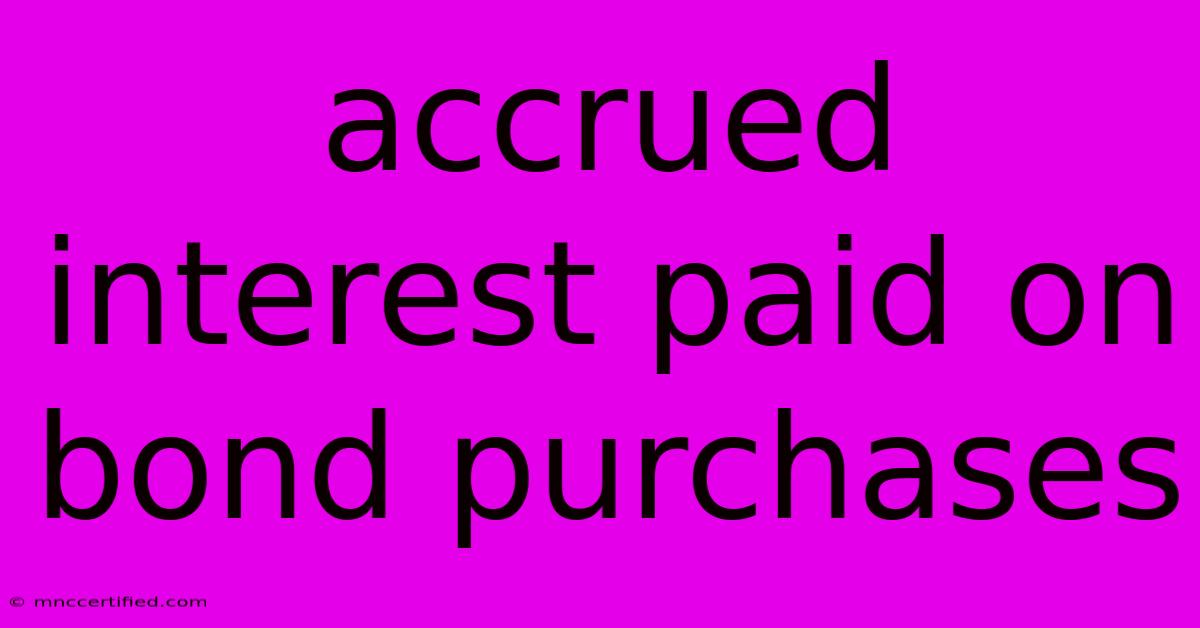Accrued Interest Paid On Bond Purchases

Table of Contents
Accrued Interest: Understanding the Extra Cost When You Buy Bonds
When you buy a bond, you're not just paying for the face value, you're also paying for any accrued interest that has accumulated since the last interest payment. This can be confusing for new investors, so let's break it down.
What is Accrued Interest?
Bonds work by paying regular interest payments, usually semi-annually, to the bondholder. But what happens when you buy a bond between these payment dates? The seller has earned interest since the last payment, and that interest is considered accrued interest. Essentially, you're buying the bond along with the right to receive the interest that has built up since the last coupon payment.
Example of Accrued Interest
Imagine a bond with a coupon rate of 5% that pays interest semi-annually. The last interest payment was made on January 1st. You decide to buy the bond on March 15th. Since January 1st, 74 days have passed.
To calculate the accrued interest, you would multiply the bond's face value by the coupon rate, divide by the number of interest payments per year, and then multiply by the fraction of the interest period that has elapsed.
Here's the calculation:
Accrued Interest = (Face Value x Coupon Rate / Number of Interest Payments per Year) x (Days Since Last Payment / Days in Interest Period)
In this case, if the face value of the bond is $1,000:
Accrued Interest = ($1,000 x 0.05 / 2) x (74 / 180) = $10.28
This means you would pay $10.28 in accrued interest, in addition to the bond's face value, when you buy it on March 15th.
Accrued Interest and the Settlement Date
The settlement date is the date when you actually receive the bond and become responsible for its accrued interest. Understanding this is crucial, as it directly impacts your total cost.
- Trade Date: This is the date you agree to buy the bond.
- Settlement Date: This is typically two business days after the trade date, when you actually take ownership of the bond.
You'll usually have to pay the accrued interest on the settlement date, even though you didn't actually own the bond until that point.
Accrued Interest and Bond Pricing
When you're looking at bond prices, remember that the quoted price often doesn't include accrued interest. This means the actual price you pay will be higher than the quoted price by the amount of the accrued interest.
Why Accrued Interest Matters
Accrued interest is a small but important part of investing in bonds. It ensures that the seller is fairly compensated for the interest they have earned since the last payment. It's also important to consider accrued interest when comparing bond prices, as the quoted price may not reflect the true cost of the bond.
By understanding accrued interest, you can make more informed decisions about your bond investments and ensure that you are getting a fair deal.

Thank you for visiting our website wich cover about Accrued Interest Paid On Bond Purchases. We hope the information provided has been useful to you. Feel free to contact us if you have any questions or need further assistance. See you next time and dont miss to bookmark.
Featured Posts
-
Insurance Companies In Cape Girardeau Mo
Nov 08, 2024
-
Warrior Trading Plain Truth Book Release
Nov 08, 2024
-
Farmers Insurance Democrat Or Republican
Nov 08, 2024
-
Insurance Claim Letter For Reimbursement
Nov 08, 2024
-
No Proof Of Insurance Ticket Mississippi
Nov 08, 2024